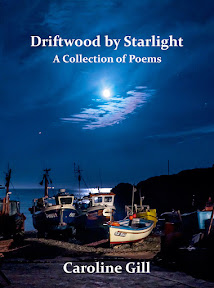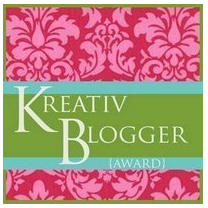
'Unthinkable Skies' (2010) by Juliet Wilson (aka 'Crafty Green Poet')
Calder Wood Press
28pp, £4.50 plus p&p - UK £1, Europe £1.50, Rest of the World £2
ISBN: 978-1-902629-28-5
Unthinkable Skies
'All poetry should aim to be like birdsong' ~Juliet Wilson
1.) The title, 'Unthinkable Skies', is both evocative and arresting. At what point in the (writing/publication) process did you settle on this title, and why did you choose it?
Unthinkable Sky is a phrase from the poem Domesticated (p11) and I thought right from the beginning it would make a good title and loose theme (covering birds, the colour blue, galaxies, air pollution etc). I changed it to the plural at a later stage. Having a title and theme as soon as I started really helped to focus my mind!
2.) 'Unthinkable Skies' as a collection demonstrates your concern for our fragile world. At what age did you first become aware of 'green issues'? (I guess I have 'Drift' and 'Mistaken Identity' particularly in mind).
I was very interested in bird-watching and nature from very early on. I was probably seven when I did the jigsaw I mention in ‘Drift’. I first became aware of conservation as an issue through books and TV documentaries when I was about nine or so.
3.) As a left-hander, I instinctively turn to the back of a book. I was delighted to find a selection of your Haiku and Senryu on the last page. I also enjoyed your Ghazals, 'Malawian Moon' (p.3) and 'Endless Skies' (p.20). Why are form and poetic craft important (assuming that you feel they are); and what is it that appeals to you particularly about these forms?
I think all poets need to understand form and craft. This doesn’t mean that we should only write formal poetry and I write a lot of free verse myself. I think writing formally develops poetic discipline and a feel for the rhythms of language. I think also it’s a good discipline for poets to have a couple of favourite forms that they aim to ‘master’.
Haiku appeal to me because of their brevity, their traditional connection with nature and the seasons and the fact that there is so much more to them than meets the eye.
I discovered the ghazal relatively recently. There’s something magical about the repetition of the key word and the way the stanzas stand alone but interact to make something bigger.
4.) You edit the popular online poetry magazine 'Bolts of Silk'. How does your role as editor strengthen your role as poet - in your opinion, of course?
I really enjoy editing Bolts of Silk. Since the beginning I’ve had a steady stream of poetry to choose from, most of it excellent. This has offered me the chance to read quite widely from contemporary poets who I may otherwise never have heard of (I think it’s vital for poets to read a lot of poetry). Editing itself also has improved my critical eye which has probably helped me to improve my own writing.
5.) Like many others worldwide, I enjoy following your 'Crafty Green Poet' blog. Does blogging fuel your poetic output - and if so, in what ways? Do your recycled handicraft ideas go hand in hand with your writing?
Blogging helps to keep me going as a writer because I know I’ve got an audience! I’m always looking for things to blog about which helps me to find ideas for poetry. There are times though when I feel that blogging steals time from writing poetry.
Crafting gives me time to think and let my mind wander - I often have poetic ideas while I’m sewing or making collages. I hope to be able to make more collage versions of my poems in the future.
6.) Those of us who read your blog know that you regularly patrol a section of the Water of Leith in Edinburgh, Scotland, for conservation purposes. Wildlife plays a key part in your published poetry: do you make mental field observations while you are out and about, or do you use a dictaphone or notebook?
When I’m walking along the Water of Leith I always carry a notebook with me and record everything that way. At other times and in other places I’m often making mental notes rather than writing things down.
7.) Your poetry is concise and your words are chosen with care, sometimes with sound in mind e.g. 'scurry', 'shush' and 'skirr' in 'Turnstones' (p.29). You hint at more than you describe, and draw inspiration and imagery from emotion and the senses. Why is it more effective to 'show' than 'tell'?
I like poems that can be understood on a first reading but that reveal more on subsequent re-readings. I think showing rather than telling can draw a person into a poem and into the re-reading of it. Any poem should bring the reader’s imagination into play!
8.) Which poets - or authors - have been influential? In what ways (in a few words)?
a) Ruth Padel – who has wonderful stage presence
b) Margaret Attwood – whose poetry always gets to the heart of things
c) Edwin Morgan – the most imaginative poet in the English language
9.) We have mentioned 'Malawian Moon'. I know that my own year in Rome was life-changing. How did your two years in Malawi transform your view of the world?
Living and teaching in Malawi was an amazing experience. It gave me first hand experience of life in a very different culture and climate than the one I was used to, which helped me to see things in a bigger perspective. It was also a place that really inspired my writing.
10.) Those of us who follow your blog really appreciate your bird notes, with links to the RSPB site. Are there similarities between birds and poems?
Haiku are like songbirds in being small and perfectly formed and dependent on the seasons. All poetry should aim to be like birdsong, uplifting to the ear but with something worth saying too.
11.) Your publisher is Calder Wood Press. Please tell us a little about the press and about your part in the publication process.
Calder Wood Press is based close to Edinburgh, in East Lothian. I’ve known Colin Will (who runs the press) for several years. The press publishes a small number of poetry chapbooks every year, mostly by Scottish poets. Colin works closely with poets in producing their books. I sent Colin an initial selection of poems, we then worked together to select the final poems. I also provided the cover photo.
12.) What advice would you give to someone preparing a first collection?
Believe in your work. Place individual poems in reputable journals. Find a good small publisher, preferably a local one, to publish your first collection, which is more likely to be a pamphlet or a chapbook rather than a full length collection. Network a lot to create an audience for your work.
Thank you, Juliet, very much indeed for your answers and information. 'Unthinkable Skies' has certainly made me want to continue to explore our world and our use of words. I very much hope that readers of this interview may care to visit the Calder Wood Press site (link) and order a copy of 'Unthinkable Skies' for themselves. This is a book that has made me think and feel.
* Photographs (under copyright) kindly supplied by Juliet Wilson








9 comments:
excellent Caroline, I really enjoyed answering your questions!
you did a wonderful job with this interview Caroline. very personal and professional. have a great weekend.
congrats Juliet on your publication.
Congratulations, Juliet! Your work is wonderful.
I enjoyed this interview.
Caroline,
You always ask the right questions to draw out the responses that reveal character as well as art.
Thanks, Kay
Excellent interview and answers, with loads of good advice. And congratulations on your chapbook, Juliet.
a lovely interview of Juliet - I follow her blog and enjoy reading about her nature aspects. I don't understand haiku (yet) but I do love the ones she has published on her blog and find them so rich. Thank you!
Excellent questions and answers. Good luck with the book.
Excellent questions and answers. Good luck with the book.
Nice interview and informative and inspiring poetry ideas. Thanks.
Post a Comment